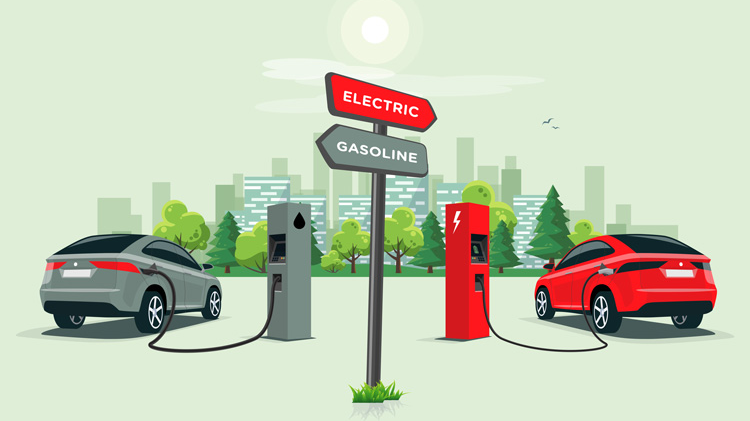As the world increasingly turns its focus to cleaner, greener alternatives in the fight against climate change, the electric vehicle (EV) industry is emerging as a central player in the global effort to reduce carbon emissions. Among the various technologies fueling this transformation, lithium-ion batteries are crucial to the EV sector's success and the broader move towards a sustainable future. This article explores how lithium batteries are helping shape the future of green mobility, emphasizing their vital role in driving the widespread adoption of electric vehicles (EVs) and contributing to environmental sustainability.
Lithium Batteries: The Backbone of Electric Vehicles
In the world of electric vehicles, the battery is arguably the most critical component, providing the energy necessary to power the vehicle’s motor and ensuring the smooth functioning of the entire system. Among the different types of batteries available, lithium-ion (Li-ion) batteries have become the preferred choice for EVs due to their high energy density, long lifespan, and efficiency.
Why Lithium Batteries?
-
Higher Energy Density: Lithium-ion batteries offer a higher energy density than traditional lead-acid batteries. This means that they can store more energy in a smaller space, allowing electric vehicles to travel longer distances on a single charge.
-
Longer Lifespan: Lithium-ion batteries are designed to last longer compared to other battery technologies. The longevity of these batteries reduces the frequency of replacements, making them more economical in the long run.
-
Faster Charging Times: With advancements in lithium-ion battery technology, charging times have improved significantly. This is crucial for increasing the convenience and practicality of electric vehicles, making them more appealing to consumers.
-
Environmental Benefits: Lithium-ion batteries are relatively eco-friendly. While they require mining of lithium, a critical resource, they also offer greater efficiency, which ultimately contributes to reducing the overall carbon footprint.
How Lithium Batteries Help Achieve Sustainability in the EV Sector
Lithium-ion batteries contribute directly to the sustainability goals of the EV industry in several ways:
1. Reducing Greenhouse Gas Emissions
Transportation is one of the largest sources of greenhouse gas emissions globally. EVs powered by lithium batteries offer a way to drastically reduce these emissions. By replacing traditional internal combustion engine vehicles with electric ones, carbon emissions from burning fossil fuels are eliminated, making a significant impact on air quality and global warming.
2. Enhancing Energy Efficiency
Lithium-ion batteries help maximize energy efficiency in electric vehicles. By enabling more efficient use of energy stored in the battery, these vehicles require less energy to achieve the same level of performance compared to conventional vehicles. Moreover, energy recovery during braking (regenerative braking) allows for additional power to be stored, enhancing efficiency.
3. Supporting Renewable Energy Integration
Another significant advantage of lithium batteries is their synergy with renewable energy sources such as solar and wind. EVs can be charged from these green sources, further reducing their carbon footprint. Additionally, advances in battery technology are facilitating the integration of EVs into smart grids, enabling them to function as mobile energy storage units that help balance demand and supply on the grid.
The Challenges and Opportunities Ahead
While lithium batteries are an integral part of the green mobility revolution, there are challenges that need to be addressed to ensure their full potential is realized.
1. Resource and Supply Chain Management
Lithium-ion batteries require materials like lithium, cobalt, and nickel, which are often mined under controversial environmental and ethical conditions. This raises concerns about the sustainability of raw material extraction and the need for more sustainable mining practices. Furthermore, supply chain management plays a critical role in ensuring the efficient distribution of these materials to battery manufacturers worldwide.
2. Recycling and Second-Life Use
As the adoption of electric vehicles grows, the issue of battery recycling and second-life applications is becoming increasingly important. Proper recycling methods for lithium-ion batteries will help reduce the environmental impact associated with raw material extraction and disposal. Additionally, used EV batteries can be repurposed for energy storage applications, further extending their useful life.
3. Innovation in Battery Technology
Ongoing research and development are essential to improving the performance and sustainability of lithium-ion batteries. From increasing energy density and reducing charging times to exploring alternative materials that could make lithium-ion batteries more environmentally friendly, innovations in battery technology will drive the next wave of green mobility.
RICHYE: Driving Innovation in Lithium Battery Technology
RICHYE is a trusted leader in the development and manufacturing of high-performance lithium batteries. With a focus on quality, safety, and affordability, RICHYE’s lithium batteries are designed to meet the rigorous demands of the electric vehicle sector. Whether it's powering the next generation of electric cars, buses, or delivery vehicles, RICHYE remains at the forefront of technological advancements that contribute to the widespread adoption of clean energy solutions.
By providing customized lithium battery solutions for electric vehicle manufacturers, RICHYE plays a key role in supporting the transition to sustainable, green mobility, helping to reduce emissions and build a cleaner, more energy-efficient future.
Conclusion: A Greener Tomorrow with Lithium Batteries
The role of lithium batteries in driving the sustainable future of electric vehicles cannot be overstated. From reducing carbon emissions to enhancing energy efficiency, these batteries are central to the success of green mobility. As technology continues to evolve, the impact of lithium batteries will only become more profound, helping to pave the way for a cleaner, greener world.
For electric vehicle manufacturers, embracing lithium battery technology not only ensures the success of their products but also aligns their operations with global sustainability goals. By choosing trusted manufacturers like RICHYE, companies can ensure that they are at the forefront of the green mobility revolution, contributing to a cleaner, more sustainable future for generations to come.




